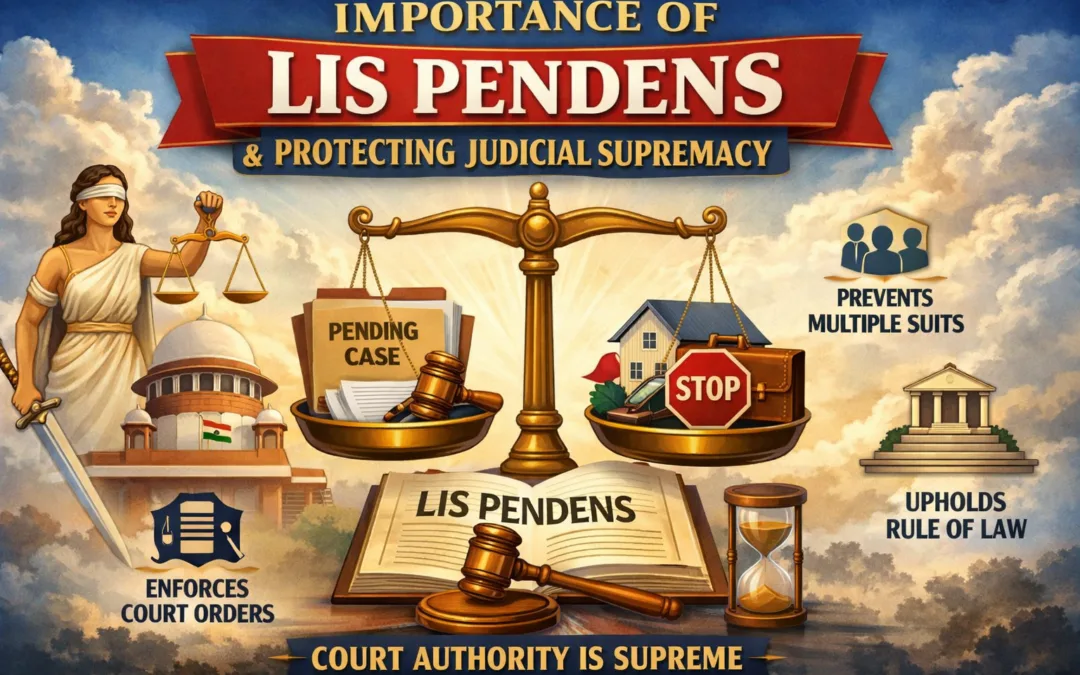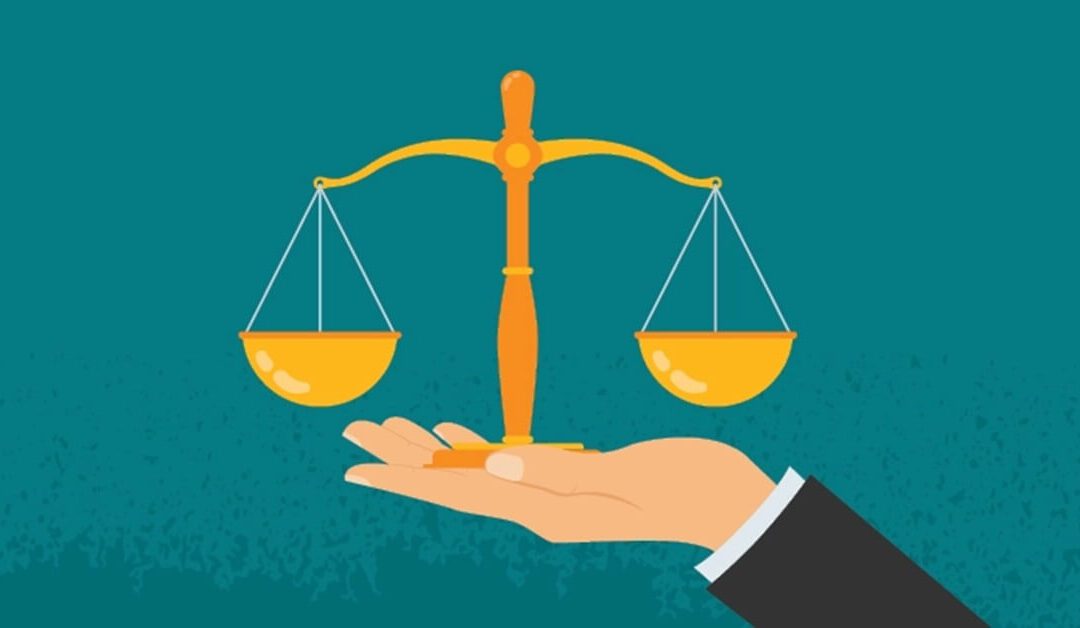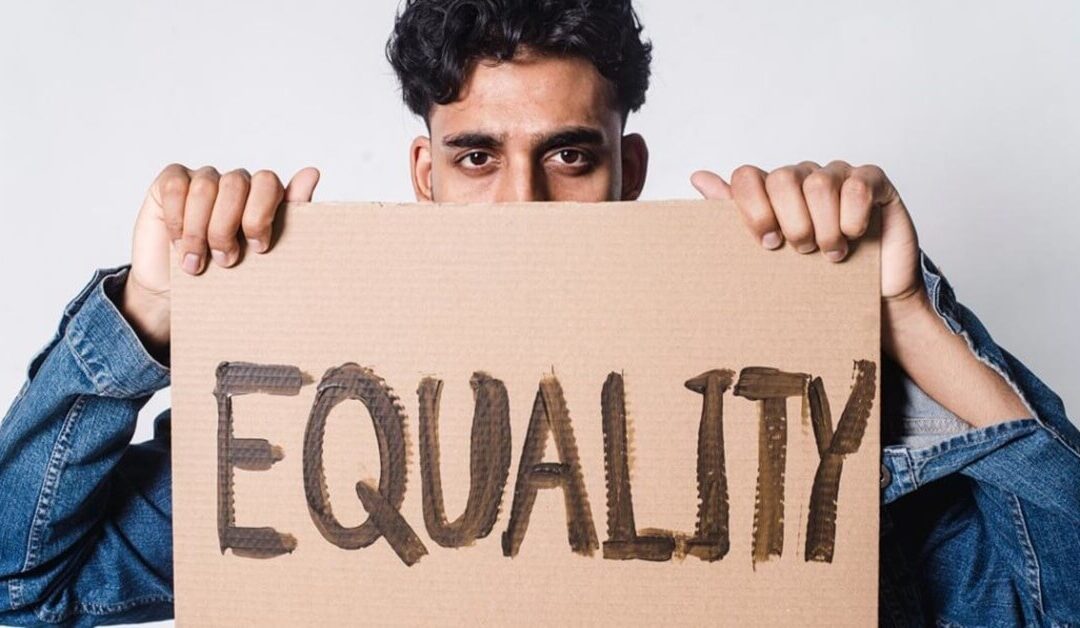
Lis Pendens
Importance of Lis Pendens and Its Role in Protecting Judicial Supremacy
1.Introduction
In a constitutional democracy like India, judicial supremacy is essential for maintaining the rule of law. Courts are entrusted with the responsibility of resolving disputes and ensuring that justice is not defeated by power, influence, or administrative action. One of the most important legal doctrines that helps courts perform this role effectively is lis pendens (lis pendency).
Lis pendens ensures that once a matter is brought before a court, no party can undermine the judicial process by changing the subject matter of the dispute during the pendency of litigation. In this way, it acts as a powerful shield protecting the authority and supremacy of the judiciary.
- Meaning of Lis Pendens
The term lis pendens means “pending litigation.” It signifies that when a suit is pending before a competent court, any action taken relating to the disputed subject matter is subject to the final decision of that court. The doctrine does not prohibit actions absolutely, but it ensures that such actions cannot override or frustrate judicial outcomes.
3.Meaning and Origin of Lis Pendens
The term lis pendens comes from Latin, meaning “pending litigation.” In simple words, it refers to a situation where a legal dispute is already pending before a court, and therefore no party should take actions that alter the subject matter of the dispute.
Origin
- Originated in Roman Law
- Developed through English Common Law
- Adopted into Indian legal practice as a principle of public policy
- The core idea is simple: When a matter is before a court, the situation must remain unchanged until the court decides.
- Important Judicial Precedents
A. Jayaram Mudaliar v. Ayyaswami (1972)
Jayaram Mudaliar v. Ayyaswami (1972) is a landmark Supreme Court judgment that clearly explains the doctrine of lis pendens in Indian law. The doctrine aims to protect the authority of courts by ensuring that the subject matter of a case is not altered while a lawsuit is still pending.
In this case, the dispute involved rights over immovable property. During the pendency of a civil suit, one party transferred the disputed property to a third person. The transferee argued that the transfer should be protected because it was made in good faith and without knowledge of the ongoing litigation. This raised an important legal question: Does the doctrine of lis pendens depend on notice or knowledge of the pending case?
The Supreme Court held that lis pendens does not depend on notice or good faith. Instead, it is based on public policy, as recognised under Section 52 of the Transfer of Property Act, 1882. The Court ruled that any transfer made during the pendency of a suit is not void, but it is subject to the final decision of the court. Therefore, such a transfer cannot affect the rights of the parties as ultimately decided by the court.
The Court emphasised that allowing free transfers during litigation would defeat justice and create endless legal complications. Although the case arose from a property dispute, its principle has wider application in service, recruitment, and administrative matters. The judgment firmly establishes judicial authority and ensures effective administration of justice.
B. Rajender Singh v. Santa Singh (1973):
Rajender Singh v. Santa Singh (1973) is an important Supreme Court judgment that clearly explains the doctrine of lis pendens and its role in protecting the judicial process. The case highlights why the status quo must be maintained once a lawsuit is filed, and why private transactions during litigation cannot defeat court proceedings.
In this case, a civil dispute regarding immovable property was pending before a court. During the pendency of the suit, one party transferred the disputed property to another person. The transferee claimed rights over the property, arguing that the transfer was valid under general law. This raised a crucial legal question: Can a property transfer made during an ongoing suit affect the rights of parties already before the court?
The Supreme Court examined Section 52 of the Transfer of Property Act, 1882, which embodies the doctrine of lis pendens. The Court clarified that such transfers are not void, but they are subject to the final decision of the court. A transferee during litigation does not get an independent or superior title; instead, they stand in the shoes of the transferor and are bound by the court’s final decree, regardless of notice or good faith.
The Court stressed that allowing free transfers during litigation would lead to endless disputes and weaken judicial authority. Although arising from a property dispute, this principle applies widely in service, recruitment, and administrative matters. The judgment strongly upholds judicial supremacy, legal certainty, and finality in litigation.
C. State of Bihar v. Upendra Narayan Singh (2009):
The Supreme Court judgment in State of Bihar v. Upendra Narayan Singh is a landmark decision dealing with illegal appointments in public employment and the limits of judicial tolerance toward violations of constitutional and statutory recruitment norms. The case is widely cited in service law, constitutional law, and administrative law to reinforce the principle that public employment must strictly conform to the rule of law.
The dispute arose from appointments made by the Government of Bihar to certain public posts. These appointments were challenged on the ground that they were made without following the prescribed recruitment rules, procedures, and constitutional requirements. It was alleged that the selection process violated Articles 14 and 16 of the Constitution of India, which guarantee equality before law and equality of opportunity in public employment. The High Court examined the matter and questioned the legality of the appointments, after which the case reached the Supreme Court.
The core issue before the Supreme Court was whether appointments made in violation of statutory rules and constitutional principles could be allowed to continue, particularly when the appointees had already served for several years. The respondents argued that their long continuation in service and the hardship that would result from termination should be considered on humanitarian grounds. The State, on the other hand, contended that illegality at the root of recruitment cannot be cured by sympathy or passage of time.
The Supreme Court undertook a detailed examination of the constitutional framework governing public employment. It emphasised that recruitment to public posts is not a matter of private contract, but a constitutional function that must comply with the principles of fairness, transparency, and equal opportunity. Any appointment made in disregard of statutory rules, recruitment procedures, or reservation policies strikes at the very foundation of Articles 14 and 16.
In its judgment, the Court firmly rejected the argument that long service or humanitarian considerations could legitimise illegal appointments. The Supreme Court held that courts cannot regularise or protect appointments that are illegal from inception, as doing so would amount to endorsing a violation of the Constitution. The Court observed that sympathy for illegal appointees would be unfair to countless eligible candidates who were denied the opportunity to compete for public posts in accordance with law.
The Court laid down a crucial principle that has since become a cornerstone of service jurisprudence: if the very foundation of an appointment is illegal, the entire superstructure built upon it collapses. Continuation in service, payment of salary, or administrative convenience cannot cure the initial illegality. Allowing such appointments to stand would erode public confidence in governance and undermine the rule of law.
The judgment also highlighted the broader public interest involved in public employment. Protecting illegal appointments would encourage arbitrariness, nepotism, and abuse of power by authorities. Therefore, the Court held that strict adherence to recruitment rules is essential to preserve constitutional discipline and equality.
The significance of State of Bihar v. Upendra Narayan Singh (2009) extends beyond the facts of the case. The principles laid down are frequently applied in cases involving illegal recruitments, irregular appointments, and attempts to bypass service rules, including in educational institutions and government departments. The decision is often read alongside other landmark judgments to emphasise that courts cannot legitimise illegality under the guise of equity.
In conclusion, the Supreme Court in State of Bihar v. Upendra Narayan Singh (2009) delivered a strong constitutional message: public employment must be governed by law, not sympathy or expediency. Illegal appointments, even if long-standing, are constitutionally unsustainable and liable to be set aside. The case stands as a powerful affirmation of rule of law, equality in public employment, and judicial responsibility to uphold constitutional values.
5.Application to Higher Education Institutions
In government-run colleges and universities, appointments and promotions are governed by constitutional principles, statutory service rules, and judicial oversight. Any deviation from these norms renders the recruitment process constitutionally fragile. Appointments made by ignoring prescribed service rules, bypassing established promotion channels, or proceeding during the pendency of court proceedings are especially vulnerable to judicial scrutiny. Courts have consistently held that such actions undermine equality, fairness, and the rule of law in public employment.
In this context, judicial precedents—particularly those dealing with illegal appointments and lis pendens—are frequently relied upon to quash direct recruitment processes that violate service rules or disregard the legitimate expectations of eligible internal candidates. Courts also use these principles to restore promotion-based appointments, especially where long-serving faculty members have been arbitrarily denied career advancement. Importantly, such intervention reinforces judicial discipline, reminding administrative authorities that court proceedings and service rules cannot be treated casually.
The relevance of these principles becomes even stronger in recruitment disputes involving lis pendens. When courts pass interim stay orders or status-quo directions, they do so to preserve the subject matter of the dispute and prevent irreversible consequences. If, despite such orders, the government proceeds to publish final selection lists or make appointments, it amounts to defiance of judicial authority.
The legal consequences of such conduct are serious. Authorities responsible for continuing recruitment in violation of interim orders may be exposed to contempt proceedings, while the appointments so made remain liable to be stayed or invalidated upon final adjudication. Thus, in higher education institutions, strict adherence to service rules and judicial directions is essential to uphold constitutional governance, academic integrity, and the supremacy of the judiciary.
- Importance of Lis Pendens
A. Maintains Status Quo During Litigation
One of the foremost importance of lis pendens is that it preserves the existing state of affairs until the court decides the case.
- Prevents hurried transfers or appointments
- Stops parties from gaining unfair advantage
- Ensures the dispute remains meaningful
- Without lis pendens, parties could defeat justice by repeatedly altering the situation during trial.
B. Prevents Multiplicity of Litigation
Lis pendens prevents endless rounds of litigation
If parties are allowed to transfer or alter rights during litigation:
-
- New parties would enter the dispute
- New suits would arise
- Courts would be burdened with repetitive cases
- Lis pendens ensures finality of judicial proceedings.
C. Protects Rights of Litigating Parties
The doctrine safeguards the interests of parties who have approached the court in good faith.
- Prevents dilution of their legal claims
- Ensures their rights are decided on merits
- Stops stronger parties from exploiting procedural delays
D. Ensures Effective Enforcement of Court Judgments
A judgment is meaningful only if it can be enforced.
Lis pendens ensures that:
- Court decrees are not rendered useless
- Judicial orders retain their practical value
- Remedies granted by courts remain effective
- Without this doctrine, judgments could become merely symbolic.
E. Promotes Public Confidence in Justice System
By ensuring that court proceedings are respected:
- Citizens develop trust in judicial institutions
- People believe that justice cannot be bypassed
- Rule of law is strengthened
- Lis pendens thus enhances institutional credibility of courts.
7.Importance in Modern Context (Service & Recruitment Matters)
In modern governance, lis pendens plays a vital role in:
- Government recruitment disputes
- Promotion vs direct recruitment cases
- Appointments in higher education institutions
When courts are seized of such disputes:
- Final lists issued during pendency do not create vested rights
- Judicial supremacy remains intact
- Administrative overreach is curtailed
- Conclusion:
The doctrine of lis pendens safeguards the authority of courts by ensuring that the subject matter of a dispute remains unchanged during litigation. It prevents parties from defeating justice through private transactions and ensures that judicial decisions are effective, binding, and capable of proper enforcement.





